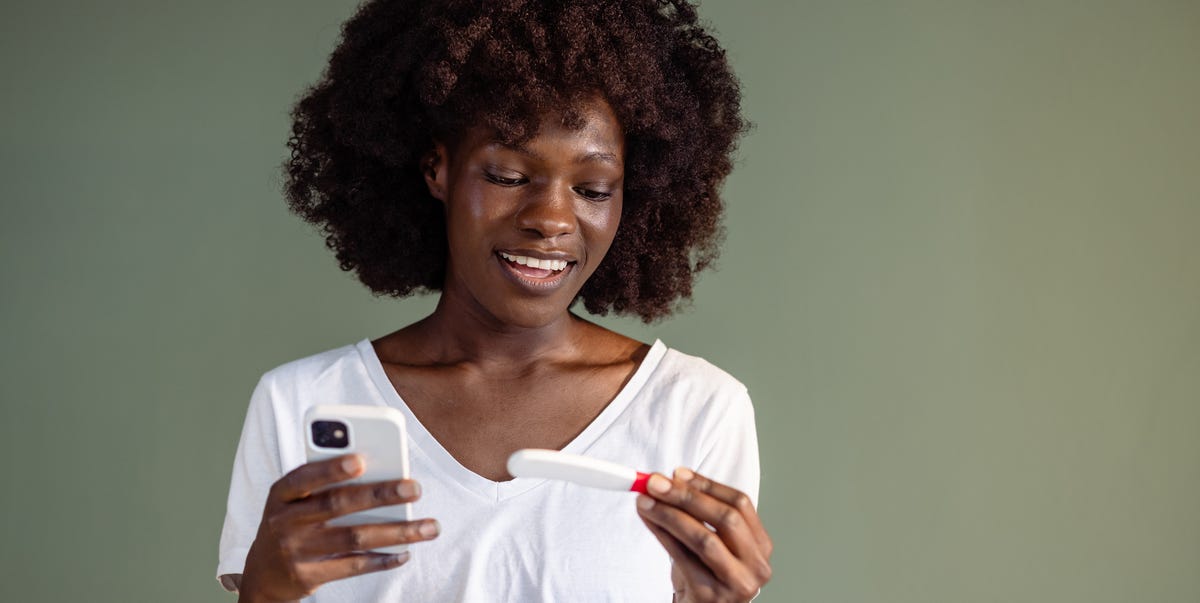It’s easy to think your journey to pregnancy will be seamless and easy, but that’s just not the case for everyone. So, you may end up doing things like tracking your ovulation, obsessing over signs of early pregnancy, and blowing through pregnancy tests like you’re made of money.
Trying to get pregnant can be an all-consuming and, at times, confusing experience, so it’s understandable that you’d want to be completely sure you understand your pregnancy test results. Enter pregnancy test apps.
Even big players in the pregnancy test industry have tapped into the app game. Back in 2016, First Response created a mobile app to track your period and ovulation, and other brands have followed. (Worth noting: First Response’s app is no longer available, even though the company continues to advertise it on the First Response website.)
Now, you can download pregnancy test apps like the Flo app, which is technically a period and ovulation tracking app that also allows you to log pregnancy test results. There’s also a popular Pregnancy Test Checker app, which promises to help users decipher if their pregnancy test is positive or negative. (And JIC you were wondering… no, you don’t have to pee on your phone for the app to decipher those results.)
Not all of these apps are free, raising some serious questions about whether you actually need a service like this in your life. Women’s Health tapped two OB-GYNs to weigh in on what potentially expecting parents need to know.
Meet the Experts: Jennifer Wu, MD, is an OB-GYN at Northwell Lenox Hill Hospital in New York. G. Thomas Ruiz, MD, is the lead OB-GYN at MemorialCare Orange Coast Medical Center in Fountain Valley, CA.
Should you use a pregnancy test app?
It depends. At baseline, doctors stress that you’re more than capable of reading a pregnancy test on your own. These tests usually show two lines if you’re pregnant and one line if you’re not. But, if you decide to pay a little extra for a digital pregnancy test, it will state if you’re pregnant or not in plain English. (This is all clearly spelled out in the instructions for each test, by the way.)
But OB-GYNs say there can be some value in apps that help to track your cycle if you’re trying to conceive. “I have my patients using apps all the time, so they can better time ovulation when they want to get pregnant,” says G. Thomas Ruiz, MD, lead OB-GYN at MemorialCare Orange Coast Medical Center in Fountain Valley, CA. “From that standpoint, they’re useful and helpful.” (Some apps are even so helpful that Ruiz doesn’t tell his patients to use ovulation kits anymore.)
Jennifer Wu, MD, an OB-GYN at Northwell Lenox Hill Hospital, also has patients who track their periods to try to figure out when they’re ovulating. “It’s very useful for women who have regular periods because there’s a pattern,” she says. “It’s not as useful for patients who have more irregular periods because their ovulation day could be different every month.”
And if you do get pregnant using a cycle and ovulation tracking app, it can also help you remember the first day of your last period—something you’ll repeatedly be asked about during your pregnancy. “They can just pull it up on the app,” Wu says.
But Ruiz draws the line at paying for one of these apps. “It seems unnecessary to purchase a pregnancy test and an app—it adds more cost, and you’re essentially measuring the same thing,” he says.
What should you do if your pregnancy test seems inconclusive?
Some apps, like the Pregnancy Test Checker, promise to help you figure out what’s happening if you get a faint second line on a pregnancy test.
But, again, doctors say you’ve got this. A faint second line may simply be a sign that you’re early in your pregnancy, Ruiz says. Pregnancy tests measure levels in your pee of human chorionic gonadotropin (hCG), a hormone produced by the placenta during pregnancy, he explains. If yours is faint, you may have just tested a bit too soon.
“If it’s just a faint line, wait two days and repeat it,” Ruiz says. “If it gets darker, you’re good.” HCG levels increase rapidly throughout pregnancy, so it’s likely your test will be clearer the next time around, he adds.
What’s the best way to confirm a pregnancy?
While an app may help you decipher whether there is, in fact, another line on that pee stick, it’s still not an official confirmation of a pregnancy. To truly confirm that you’re pregnant, it’s important to see a doctor.
“They can do a blood test, which can definitively tell if you’re pregnant or not,” Wu says. Ruiz agrees: “A blood test is considered the gold standard, but the urine pregnancy tests are pretty good.”
If you get a positive at-home pregnancy test and you generally feel fine, most doctors will schedule you for your first prenatal visit between seven to eight weeks from your last period. At that visit, a doctor will likely give you a blood test and urine test, as well as perform an ultrasound, Ruiz says.
Once your pregnancy is confirmed, your doctor will usually set you up for the first of many monthly prenatal visits to make sure they can monitor the development of your pregnancy.
So, while an app may help you feel more in control of trying to get pregnant, it’s no substitute for seeing your doctor. Ultimately, they’re the ones who can confirm a pregnancy—and make sure you’re as healthy as possible going forward in your maternity journey.
Korin Miller is a freelance writer specializing in general wellness, sexual health and relationships, and lifestyle trends, with work appearing in Men’s Health, Women’s Health, Self, Glamour, and more. She has a master’s degree from American University, lives by the beach, and hopes to own a teacup pig and taco truck one day.
Read the full article here




